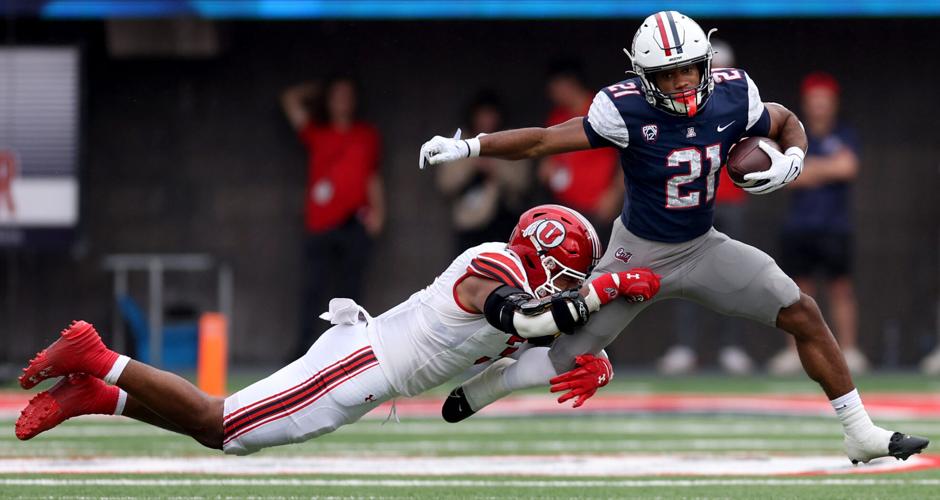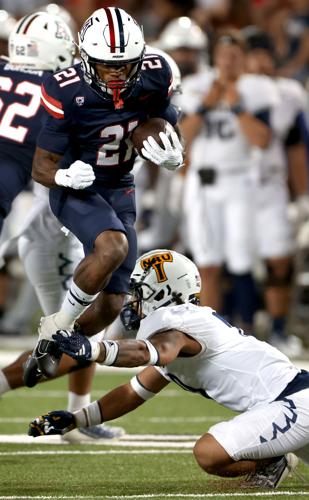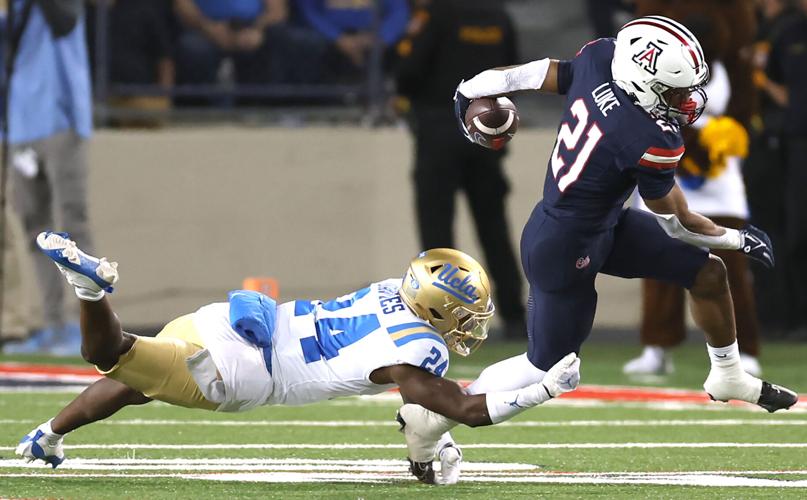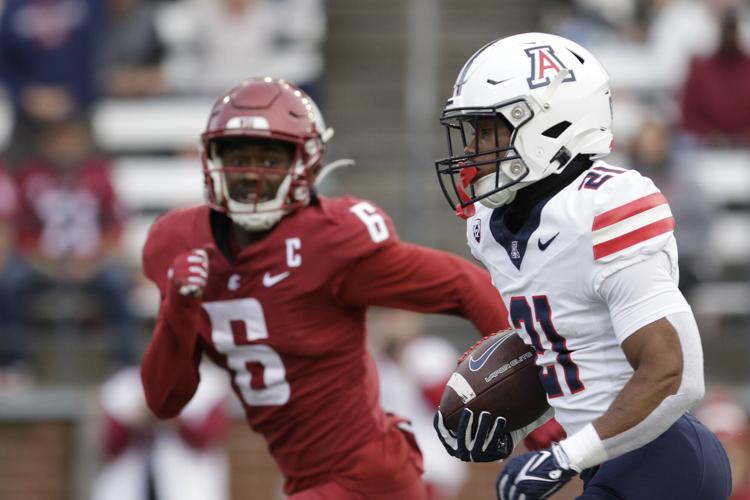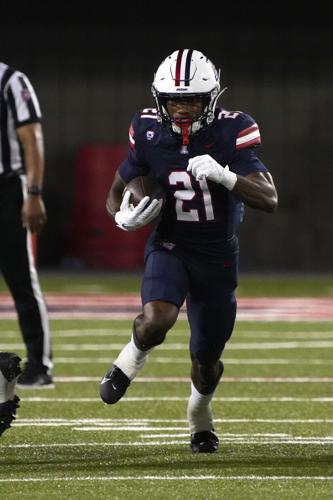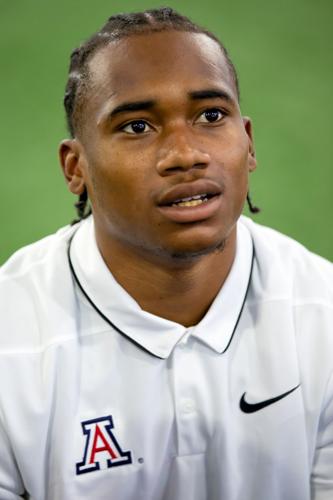Not every 6-year-old boy can say they’re friends with Snoop Dogg. Arizona running back Rayshon “Speedy” Luke could.
As a Los Angeles-area youngster, Luke played in the Snoop Youth Football League, but was always an opponent of the team coached by the the rapper known as D-O-Double-G.
“He always wanted me on his team,” Luke said. “My father didn’t want me on his team, because we considered his team the ‘cheat-code team.’ He had all the good guys in California, so we didn’t want to go that route ... and I had always played against him. Like I said, he always wanted me on his team, which made him and my father bond, and ever since then, he’s been like an uncle to me.”
Not playing for a “cheat-code team” had a role in his decision to sign with Arizona as a four-star running back coming out of national powerhouse St. John Bosco High School in 2022.

Utah linebacker Levani Damuni (3) manages to catch Arizona running back Rayshon Luke (21) after he hauled in a pass in second quarter of their Pac-12 matchup at Arizona Stadium on Nov. 18, 2023.
“That’s why I came here,” he said. “I didn’t know anything about Arizona, of course. When I first heard about them, knowing that (quarterback Noah Fifita) was committed here, I played against Noah my whole high school career. (Linebacker) Jacob Manu, played against him my whole high school career.

Arizona running back Rayshon Luke (21) tries to hop over NAU defensive back Shawn Dourseau (0) in the fourth quarter of the Wildcats' season-opening win over the Lumberjacks at Arizona Stadium on Sept. 2, 2023.
“Why would I go somewhere that’s already been good rather than come here and let’s make it good? Make Tucson what it has been and what it used to be. That was my mindset in my recruitment and that’s why I came here.”
Luke committed to Arizona at halftime of the 2022 All-American Bowl at the Alamodome in San Antonio, the same site of the Wildcats’ Alamo Bowl win last season. Luke was named MVP of the All-American Bowl for his two-touchdown performance, flashing why he earned the nickname “Speedy.”
In Luke’s announcement on NBC, with his family standing behind him, Luke picked up an Arizona hat and committed to the UA over Louisville, UCLA and San Jose State, where he was recruited by current Arizona head coach Brent Brennan and running backs coach Alonzo Carter.
“We actually thought we had him,” Carter said of Luke. “He was the number one recruit on our board at the time. ... Everything about him, I knew his strengths and weaknesses, and I was looking forward to working with him. So here it is, you fast forward two years later, I’m able to still do that.”

Arizona running back Rayshon Luke (21) turns the corner on UCLA defensive back Jaylin Davies (24) and heads to the red zone before finally being brought down in the fourth quarter of their game at Arizona Stadium on Nov. 4, 2023.
Luke said “it was amazing getting recruited by” Carter out of high school, and “now that he’s here, it’s amazing. ... It’s just getting better.”
“The fact that he did come here, made it easier (to stay),” Luke said. “I’m here. That tells you how close me and him are.”
A few things have changed in Luke’s life since he committed to Arizona.
He became a father to a now 10-month-old daughter, Ra’myia, who was born last May.
“It’s been amazing,” Luke said. “I took everything for granted, but I didn’t understand what was going on in my life. I was just going through the motions, if that makes sense. I’m able to sit back and think, ‘OK, I gotta do this for someone, because it’s not about me anymore. ... It’s about the baby.’ That’s just how it goes and it’s been really great being a dad.”
Luke has prioritized sleep since becoming a father. Bed time is between 9-10 p.m.
“That gives me and the mother time to sleep as well and get up to get ready for work the next day,” he said.

Arizona running back Rayshon Luke, right, carries the ball on the way to a touchdown as Washington State defensive back Chau Smith-Wade chases him during the first half during the Wildcats' October 2023 win in Pullman, Washington.
Luke also took a backseat in a running back rotation that had multi-year starter and do-everything back Michael Wiley, veteran transfer DJ Williams and the hard-to-take-down Jonah Coleman. Luke’s carries more than doubled in his second season, elevating from 15 carries for 105 yards, to 37 touches for 153 yards and a touchdown, in addition to four receptions for 95 yards. Luke’s highlight moment of his second season at Arizona was a 40-yard touchdown run in the Wildcats’ 44-6 rout of Washington State.
But while Wiley, Coleman and Williams were Arizona’s go-to trio at running back, Luke was “just waiting on my turn,” used in pinches over the last two seasons.
“My turn is finally here now, so I’m going to exceed and do it with my brothers and teammates around me,” he said.
Luke learned about “leadership and how they moved around the building” behind Wiley, Coleman and Williams.
“They were always here, always active, always present, and how they attacked practice, how they attacked the games, how they attacked meeting rooms, how they studied, watch film, all of it,” Luke said. “I try to take things from all of them.

Arizona running back Rayshon Luke (21) runs upfield in the first half of the Wildcats' season-opening win over NAU on Sept. 2, 2023, in Tucson.
“We all learned from each other and now it’s helping me out.”
In the middle of the season, Coleman said Arizona’s running backs compared themselves to cars, and Luke was labeled a Lamborghini for his speed and light 5-9, 175-pound frame.
In comparison to the other running backs Arizona has between San Jose State transfer Quali Conley, a 5-10, 210-pound senior, and incoming New Mexico transfer Jacory Croskey-Merritt, the 5-11, 204-pound Montgomery, Alabama native, Luke is still the Lamborghini of the bunch.
Between Conley and Croskey-Merritt, who is joining the team in the summer, their production gives them an advantage on Luke in the rotation. Conley finished seventh in the Mountain West with 842 yards and nine touchdowns this past season, while Croskey-Merritt had 1,190 rushing yards — which ranked 23rd in college football — and 17 touchdowns at New Mexico last season. He also averaged 6.3 yards per carry last season, and his 17 rushing touchdowns ranked fifth nationally. The Wildcats also have rising freshmen in second-year player Brandon Johnson and early enrollee Jordan Washington, a four-star prospect in Arizona’s 2024 recruiting class competing for snaps.

Rayshon ‘Speedy’ Luke
Fortunately for Arizona’s crowded running back room, the days of work-horse running backs at the collegiate and professional level seem to be in the past.
“You want to be available. Of course, in high school you get the ball every play. That’s not going to end well for you if you’re trying to go to the NFL,” Luke said. “You want to be available. So it comes with growth and understanding that you need to take less reps if you want to have an extended career.”
But if any Arizona running back wants to become a mainstay in the offense, Carter has one rule — and he has signage of the credo for his running backs in his office at Lowell-Stevens Football Facility: “No block, no rock.”
“If you don’t block, you don’t protect, you’re not going to play,” Carter said.
Luke is on track to be “a major part in what we’re doing with our offense” as a running back and pass-catcher, in addition to “being huge in the special teams space,” according to Carter.
“I think that’s a challenge I have for him,” Carter said of Luke. “There’s so many ways you can affect a football game. It’s not about running or catching the ball. You can change the game in the special teams space, as well as being a change-of-pace running back, third-down back, which means you need to know how to do pre-snap reads, block, protect.
“We have one of the best quarterbacks in the country, so he needs to be able to count on you to ID and protect things. I’m going to find ways to get him on that football field, because he’s a very dynamic player. He’s really humble, he’s a great teammate, he’s one of our returners and I just want to see him shine, because he’s earned the opportunity to do that.”
Arizona Wildcats running back Rayshon “Speedy” Luke, speaking after a UA spring football practice on April 2, 2024, shares about becoming a father in the last year, his relationship with Snoop Dogg, and taking a chance on UA in 2022. (Justin Spears/Arizona Daily Star)
Arizona football players Quali Conley, Rayshon Luke, Jordan Washington and Brandon Johnson speak after the Wildcats' April 2, 2024, spring practice session. (Courtesy Arizona Athletics)
Arizona football assistant coach Alonzo Carter speaks after the Wildcats' April 2, 2024, spring practice session. (Courtesy Arizona Athletics)


